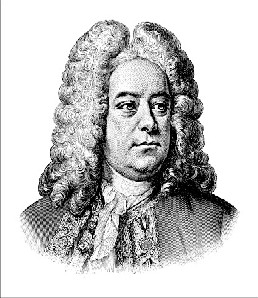The following remark is attributed to Johann Sebastian Bach (1685-1750):
[Handel] is the only person I would wish to see before I die, and the only person I would wish to be, were I not Bach.
Upon hearing the above statement, Wolfgang Amadeus Mozart is said to have exclaimed:
Truly, I would say the same myself, if I were permitted to put in a word.
The English composer William Boyce (1711-1779) is believed to have said the following, concerning Handel's numerous borrowings, thefts and parodies of the music of others:
He takes other men's pebbles and polishes them into diamonds.

The Life and Times of George Frideric Handel (1685-1759)
According to a contemporary account by Sir John Hawkins (1719-1789), London magistrate, amateur musician, patron of the arts and a personal friend of Handel, given in his book A General History of the Science and Practice of Music…
[Handel was] ….in his person a very large made and portly man. His gait, which was ever sauntering, was rather ungraceful, as it had in it something of that rocking motion, which distinguishes those whose legs are bowed. His features were finely marked, and the general cast of his countenance placid, bespeaking dignity attempered with benevolence, and every quality of the heart that has a tendency to beget confidence and insure esteem. He was impetuous, rough and peremptory in his manners and conversation, but totally devoid of ill-nature or malevolence; indeed there was an original humour and pleasantry in his most lively sallies of anger or impatience, which, with his broken English and heavy Germanic accent, were extremely risible. His general look was somewhat heavy and sour, but when he did smile it was like the sun bursting out of a black cloud.
Handel’s stature and position as one of the greatest Baroque composers of operatic, choral, ceremonial and instrumental music has long been recognised, and his eclectic and catholic style drew readily on direct influences from the music of Germany, Italy and England. As well as having been a brilliant composer, Handel is also regarded as having been a great dramatist, bringing the texts of his operas, oratorios and anthems vividly off the page with all manner of musical devices. His surviving compositions include 42 operas, 29 oratorios, more than 120 cantatas, numerous trios, duets and arias, much chamber music including many instrumental sonatas and concerti grossi, a large volume of keyboard music, odes and serenatas, dance suites, coronation anthems written for the British monarchy, and sixteen organ concerti. Handel spent the majority of his professional and productive life in London and, informed and influenced by earlier time spent in Germany and Italy, he introduced previously uncommon musical instruments into Britain through his works. These included the viola d'amore, the lute, the trombone, small and high-pitched cornetts, the theorbo, the French horn, the double bassoon, the viola da gamba, the carillon, the positive organ, and the harp.